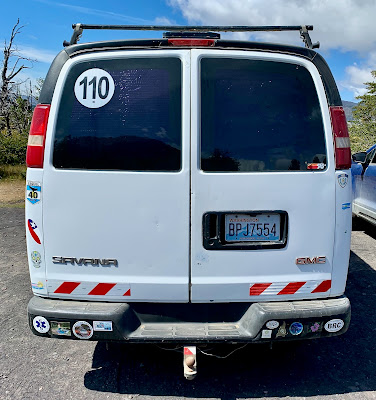Having received an advance from my publisher, I am theoretically updating the current edition of Moon Patagonia, but it’s not quite that simple. When I flew to Chile in late February, after a few days in Santiago I drove south to the volcanic highlands of the Araucanía region and across the Argentine border to San Martín de los Andes and San Carlos de Bariloche. I abruptly returned to Chile, though, when Santiago announced the impending closure of the borders between the two countries.
 |
| In mid-March, Chile was about to close the border with Argentina because of the Coronavirus crisis. |
I had double-checked and acquired quite a bit of material in the process but, when I left to return to California in late March, I told my Chilean friends—one of whom is storing my car in Santiago—that I hoped to return in November, but couldn’t guarantee that would be the case. February or March of next year sounded a bit more realistic. Even now, that’s far from certain because of the Coronavirus crisis, which is worsening in Chile—though it’s not yet reached the levels of misgoverned countries like Brazil, the United Kingdom and, of course, the United States.
 |
| COVID-19 trends are worsening in Argentina and Chile, but still not close to those in the United States, Brazil, or the UK. |
Many people are without work these days, but my own is simply in limbo even if, in theory, I could be working on the book in question. In past years, spending the summer at home in Oakland before heading south after the World Series, I would revise background material such as government and politics. Still, even before I arrived in Chile earlier this year, that was full of uncertainty with the pending plebiscite on a new Constitution—now rescheduled for October 25th—and whether the accompanying political unrest might affect the travel and tourism sector.
The public health crisis, of course, put that issue on the back burner—almost literally, as the Chilean government decided (rightly, in my opinion) that holding an election in the midst of a pandemic was risky. For what it’s worth, the country does not allow absentee voting, so vote-by-mail is not an option; voting was once obligatory, but that is no longer the case. Interestingly, Chile does allow resident non-citizens to vote in its elections.
 |
| Open-air dining space at Pucón's Loretano |
Besides background material, though, there’s equal uncertainty about tourist services. In my short time in South America, I discovered new restaurants, such as the Peruvian Loretano which, at present, continues serving takeout meals in Pucón. Still, in the aftermath of the public health crisis, many restaurants, accommodations and other services are sure to fail or, at least, change dramatically. It’s too early to say whether Loretano, or even established accommodations and restaurants with a solid track record over the decades, will necessarily survive.
 |
| I'd love to try the Peruvian-style ceviche at Loretano again. |
Even if the travel and tourism sector re-opens, there’s another obstacle for me (and many other US citizens). Everybody knows, of course, about the notorious vanity wall under construction at the Mexican border, but now the current White House occupant’s minions are taking it to another level entirely. My US passport expires in early September, and I recently learned that the State Department is not processing either new or renewal applications so that, even if Argentina and Chile open up for tourism, it's uncertain (at best) when we'll be able to return.
The United States, of course, always used to criticize the Soviet Union and its allies for confining their citizens within their borders—most notably after the erection of the Berlin Wall. Now, it seems, any supposed “reopening” of the US has its limits, as its citizens must contend with walls—not just to keep foreigners out, but also to keep us in.


1 comment:
Thanks for the passport notice. I had assumed I had five years to renew my expired passport using the form DS-82. While the renewal period may continue to be valid, the perfunctory process has been rescinded. According to the COVID-19 update on www.travel.state.gov the form is destined to expire and warns: "Unless you have a life-or-death emergency, please wait until we resume normal operations to apply for or renew your passport."
Post a Comment